
The SOA Analysis & Modeling with Services & Microservices course provides in-depth coverage of service and API modeling for microservices and other services, including complex service compositions and service inventory blueprints. It explores SOA analysis techniques, models and approaches, and further delves into step-by-step processes for service and microservice analysis and modeling for REST and Web service mediums, highlighting the establishment of service layers in a conceptual blueprint.
Complete the SOA Analysis & Modeling with Services & Microservices course and, optionally, get accredited as a Certified SOA Analyst by passing the certification exam. You can purchase the course now and get the exam later, or you can get them together at a discount as part of the Certification Bundle.
Upon completing the course you will receive a digital certificate of completion, as well as a digital training badge from Acclaim/Credly. Because this course encompasses both the SOA Professional and SOA Analyst certifications, upon passing the exam you will also receive official SOA Professional and SOA Analyst digital accreditation certificates and certification badges from Acclaim/Credly, along with an account that can be used to verify your certification status.
If you already completed the SOA Professional course modules, you can purchase a partial course (or a partial bundle) with only the modules specific to the SOA Analyst track here.
Choose the Certification Bundle to receive the entire course together with the online-proctored certification exam and a set of practice exam questions, all at a bundle discount.
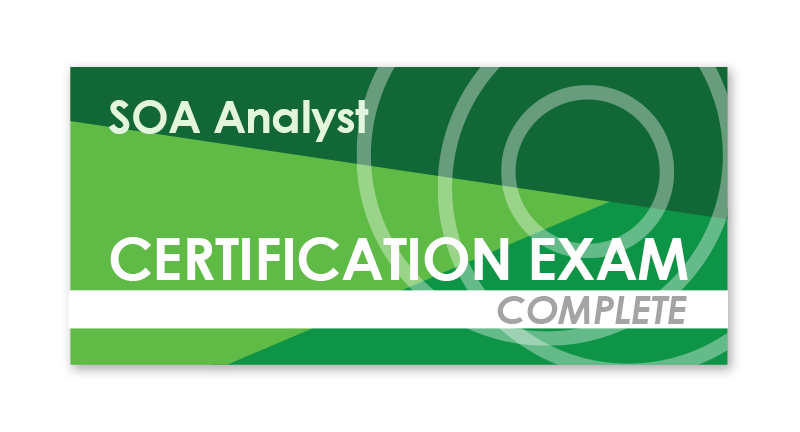
Exam Details

Exam Details
Upon purchasing this course, you will automatically receive access via the Online Interactive eLearning platform. To provide you with the greatest flexibility, you will also have the option to access the course materials via two additional eLearning formats, at no extra cost. All three eLearning formats are briefly described below. A more detailed comparison can be found here.
- For everyday learning: An online interactive eLearning platform with individual lessons, as well as interactive and automatically graded exercises and practice questions.
- For learning on-the-go: A study kit platform with access to full course documents that support online/offline synching, annotations, comments, custom bookmarks and cross-document searches.
- For your reference: A set of printable watermarked PDF documents that you can keep (for all course workbooks and posters).
All three forms of access are subject to Arcitura’s *.
Upon purchase, access to the online interactive eLearning platform (1) is provided within one business day. Access to the study kits (2) and the PDF documents (3) is provided upon request.
The course is comprised of a set of modules. Each module has a set of lessons and is further supplemented with exercises to help reinforce your understanding of key topics. Shown below are the digital contents and the topic outline for each course module:
Module 1: Fundamental SOA, Services & Microservices
This course module provides an easy to understand, end-to-end overview of contemporary service-oriented computing, including concepts and technologies pertaining to modern-day services and microservices, as well as business and technology-related topics pertaining to service-oriented architecture (SOA).
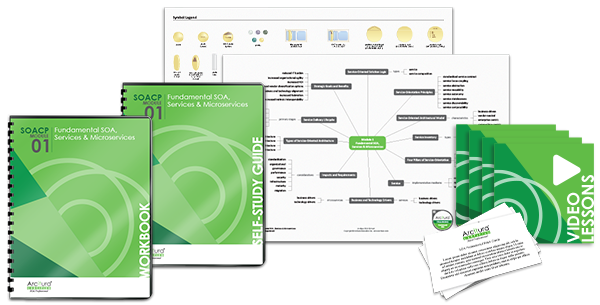
Course Module Contents
Topics Covered
Module 3: Design & Architecture with SOA, Services & Microservices
This course module delves into the service-oriented architectural model and the service orientation design paradigm and establishes the unique characteristics and dynamics that constitute service-oriented solution logic. The module raises a series of distinct considerations for designing service-oriented solutions with microservices, as well as REST services and Web services.
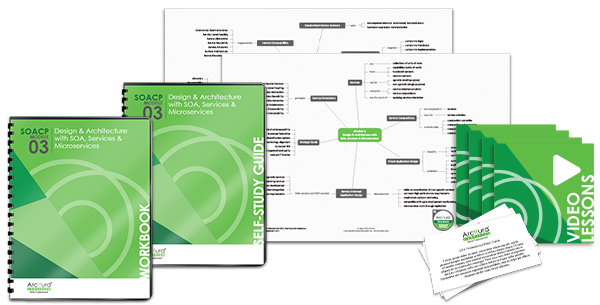
Course Module Contents
Topics Covered
Module 4: Fundamental SOA Analysis & Modeling with Services & Microservices
This course module provides comprehensive coverage of SOA analysis techniques and approaches, including strategies and concepts for service modeling, composition modeling and microservice modeling. Topics include service models and service layer abstraction, entity, utility and micro task abstraction, as well as specialized service API modeling techniques.
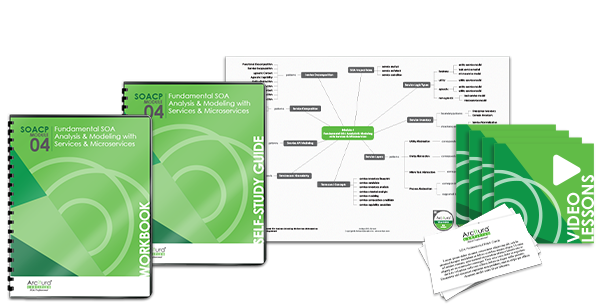
Course Module Contents
Topics Covered
Module 5: Advanced SOA Analysis & Modeling with Services & Microservices
This course module delves into the step-by-step processes for the analysis and modeling of services and microservices for REST service and Web service environments. It covers a range of topics with an emphasis on business service context, service models, microservices, functional scope definition, balanced granularity and establishing effective service layers as part of an overall conceptual blueprint.
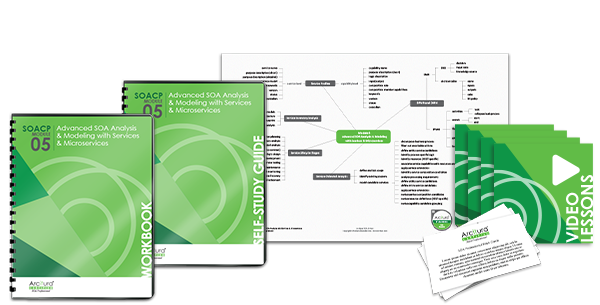
Course Module Contents
Topics Covered
Module 6: SOA Analysis & Modeling Lab with Services & Microservices
This course module presents participants with a series of exercises and problems that are designed to test their ability to apply their knowledge of topics covered in previous modules. Completing this lab will help highlight areas that require further attention and will help prove proficiency in SOA analysis processes and service modeling techniques.
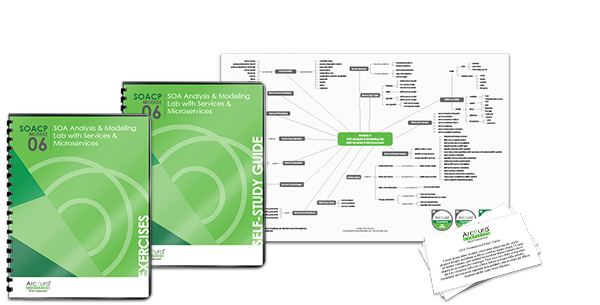
Course Module Contents
Topics Covered
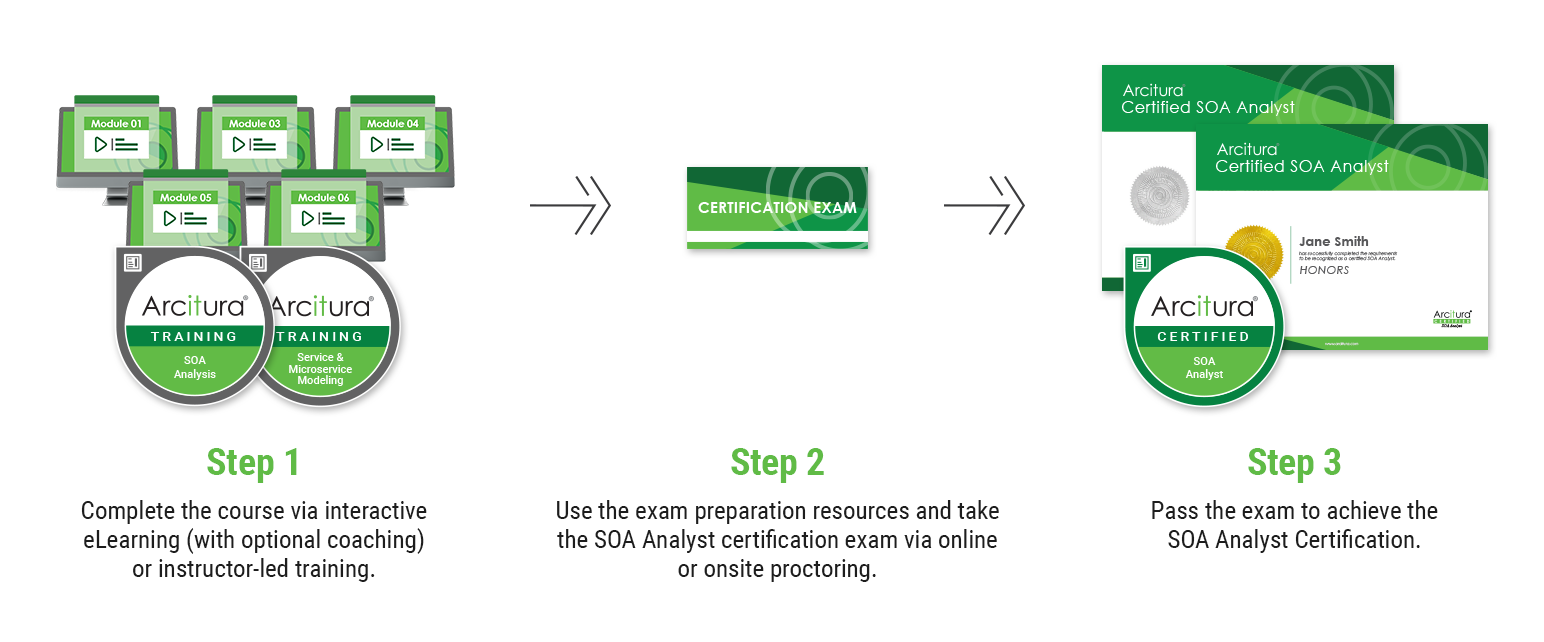
Learn About Arcitura: Take the Video Tour
Watch these helpful informational videos to learn about Arcitura programs, courses and certifications.
About Arcitura
About Arcitura Courses
About Arcitura Certifications
What’s in an Arcitura Course
Comprehensive
Coverage
Each course provides a comprehensive curriculum with 2-3 modules and 20-40 hours of training.
More Than Just
Video Lessons
In addition to standard video lessons, courses include full-color workbooks and reference posters for all
lessons.
Interactive & Graded
Challenges
Courses also include interactive and graded exercises, interactive and graded self-tests and other
supplements.

The Arcitura Difference

EACH COURSE
- is authored by a dedicated courseware development team
- has a self-test, accreditation exam and professional certification
- is available via two different eLearning platforms
ALL COURSES
- undergo a common development process
- are authored to be consistent in quality, structure and style
- share a common vocabulary and symbol notation
- are authored in collaboration with subject matter experts
Take Your Skills Anywhere
Because both courses and accreditations are vendor-neutral, they empower you with skills and credentials that you can take to wherever you need to go.

Lifetime Access Guarantee
Access to the eLearning platforms is dependent on third-party platform providers. As a result, Arcitura cannot make any guarantees or warranties regarding the behavior or availability of the platforms, nor can Arcitura guarantee a specific duration for which these platforms will remain available. When your course is set up on an eLearning platform, your access will have no expiration date and will be provided indefinitely. The PDF documents that can be made available for you to download are yours to keep forever.





